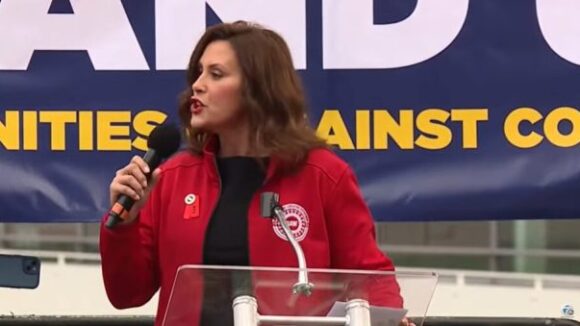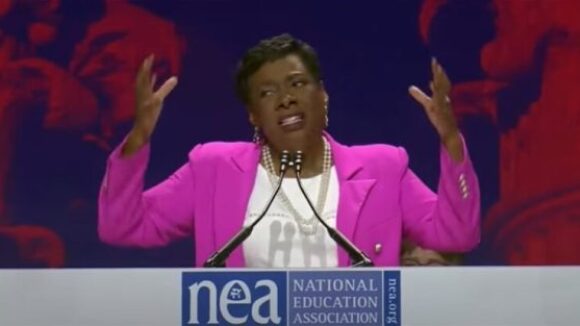Tyranny Triumphs in the Great Lakes State
Ignoring ample evidence of forced unionism’s unfairness and its damaging impact on jobs and incomes, Big Labor Michigan Gov. Gretchen Whitmer signed Right to Work destruction in 2023.

On February 26, the U.S. Supreme Court heard oral arguments in what Washington Post editors call “the most important labor case of the 21st century to date,” Janus v. AFSCME.
Mark Janus, the plaintiff in this case, is an Illinois civil servant and union nonmember compelled by state law to pay monthly fees to officers of the American Federation of State, County, and Municipal Employees union and its Chicago-based AFSCME Council 31 affiliate.
If he refused, he would be fired.
At the hearing, Mr. Janus’ counsel of record, Right to Work staff attorney Bill Messenger, and U.S. Solicitor General Noel Francisco argued that pro-Big Labor laws in Illinois and other states are unconstitutional.
Such laws violate the First Amendment, explained Mr. Messenger and Mr. Francisco, when they force public servants like Mr. Janus to support union-boss political and ideological advocacy directed at public officials.
Ending Compelled Advocacy Raises ‘an Untold Specter Of Labor Unrest’?
If the Supreme Court ultimately agrees with Mr. Janus, governments at all levels will have to give their employees a choice about whether or not they pay union dues or fees.
Union officials are mortified that a large share of the estimated five to six million public workers across the U.S. who are currently forced to bankroll a union as a job condition will cease paying for any union activities.
Janus thus “has the potential to radically cut the power and funding available to state and local employees’ unions,” as Financial Times (London, UK) columnist John Dizard observes.
The counsels defending forced fees on behalf of AFSCME union bosses and the Illinois attorney general only half-heartedly challenged their opponents’ characterization of such fees as compelled political/ideological advocacy.
But they insisted the plaintiff’s petition must regardless be rejected because forced fees are “the tradeoff for no strikes.”
If Mr. Janus wins, declared the AFSCME lawyer, it will raise “an untold specter of labor unrest throughout the country.”
After the hearing, top union officials reiterated this threat again and again.
On March 2, for example, American Federation of Teachers union President Randi Weingarten tweeted her agreement with the warning of a former union organizer and current Bloomberg Businessweek reporter that Americans could expect government strike disruption to become “more common” once the Supreme Court makes the public sector “all ‘right-to-work.’”
As Mr. Messenger noted, it would be bad for the country and the High Court if a majority of justices allowed public-sector forced fees to continue “effectively as a form of protection money,” even if the alternative really were more strikes disrupting vital government services.
Government Union Lawyer’s Dark Scenario Is Extremely Improbable
Fortunately, history indicates the dark scenario envisioned by the likes of AFSCME lawyer David Frederick and Ms. Weingarten following a pro-Right to Work Janus decision is extremely improbable.
As a friend-of-the-court brief filed by attorney James Abernathy on behalf of the Olympia, Wash.-based Freedom Foundation shows, government-sector strikes have for many years been far less common in states with Right to Work protections for employees than in states without them.
Federal Mediation and Conciliation Service data show government workers in Right to Work states “went on strike at a lower rate” than public-sector workers in forced-fee states “in all 33 years studied” by Freedom Foundation researchers.
In what seems to be a concerted effort to counter all this history, Big Labor and its allies in the media recently trumpeted a nine-day-long K-12 public education strike in Right to Work West Virginia that conveniently started the Thursday before the Janus hearing.
“The three states with the most teacher strikes since 2010 are forced-unionism Pennsylvania, with 29, forced-unionism Illinois, with 18, and forced-unionism California, with seven. What just happened in West Virginia is obviously not evidence that Right to Work causes strikes,” commented Greg Mourad, vice president of the National Right to Work Committee.
He concluded: “Since a number of its own precedents have found that the forced subsidization of speech regarding matters of public policy violates the Constitution, the High Court really has no choice but to rule in favor of Mark Janus.
“It certainly shouldn’t fail to do so in response to union-boss threats of labor unrest if Mr. Janus’ First Amendment rights are vindicated.”
(Click here to download the May 2018 National Right to Work Newsletter)

Ignoring ample evidence of forced unionism’s unfairness and its damaging impact on jobs and incomes, Big Labor Michigan Gov. Gretchen Whitmer signed Right to Work destruction in 2023.

Largely thanks to the Right to Work attorney-won U.S. Supreme Court decision in Janus v. AFSCME, union bosses like NEA President Becky Pringle are no longer able to block virtually all meaningful education policy reforms.

Avelo employee Kim Howard believes all the firm’s flight attendants should get to vote on continued AFA rule. Credit: WTNH-TV (ABC,…